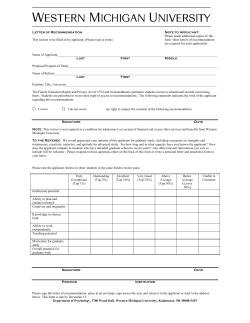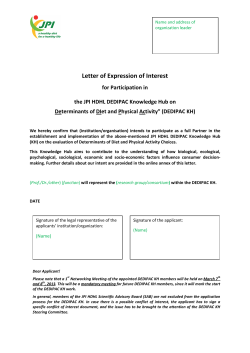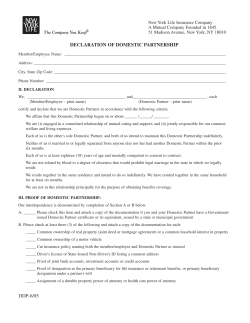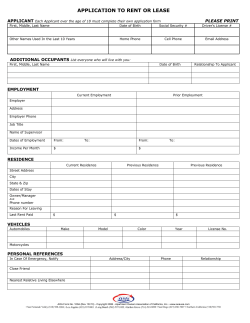
GUIDELINE FOR COMPLETING YOUR APPLICATION www.workingwithchildren.nt.gov.au Phone: 1800 723 368 (1800 SAFENT) Email:
www.workingwithchildren.nt.gov.au Phone:1800 723 368 (1800 SAFENT) Email: safent.police@nt.gov.au GUIDELINE FOR COMPLETING YOUR APPLICATION Please read the instructions in this guideline prior to completing your application form for a Working With Children Clearance. Failure to complete the form appropriately will result in the form being returned to you for amendment. If you do not understand any instruction or have questions about the completion of the Application Form, please contact SAFE NT on telephone 1800 723 368. Do you have the right form? • • If you are employed or are seeking employment in child-related work complete form PF190-E If you are going to be volunteering with an organisation in a child-related work field, please complete form PF190-V Section A – Personal details As part of the screening process involves a National Criminal History Record Check, it is very important you complete this section fully. It is mandatory to provide your Full name, Date of Birth, Town/City, State and Country of Birth, and a Current Residential Address. Without these details, your application cannot be processed and will be returned to you. Please list any other names that you have ever been know as. This important information will inform the criminal history check process, and help ensure correct identification where there is more than one candidate with the same name. Your Postal Address will be used to forward any communication from the Screening Authority, including your Clearance Notice and Ochre Card. Ensure this section is completed if you currently reside outside of the Australia Post delivery area. Section B – Previous residential addresses Providing previous residential addresses can assist with ensuring that the name matching done as a part of the criminal history check process is correct, and that no details are attributed to your name that are not a part of your own history. Please list previous addresses for the past 5 years, starting with the most recent but not including your current address. If you cannot remember exact details, just note the approximate years and town/State of residence. Attach a separate page if you require further space. Section C – Photo for ochre card Your Clearance Notice will be accompanied by an Ochre Card that carries your photo and personal details. Do not staple this photo to the form. As you are required to provide one certified copy of a piece of photographic identification, eg your drivers licence or passport, you do NOT need to have the back of this photo certified. Photos should meet the following standards. • Photos must not be more than six months old. • It must be 45-50 mm in height and 35-40 mm in width (Passport sized) • It must show a close up of the applicant’s head and the top of the shoulders • The image must be centred, clear and in sharp focus with no shadows; • The image must be of high quality, with no ink marks or creases; • If taken with a digital camera, the photograph must be of a high quality and resolution (no pixelised images) and printed on photo-quality paper A detailed Photograph Guidelines fact sheet is available for more information. If you lodge your form in person at the SAFE NT office in Darwin, you will be able to have your photo taken on site. Section D- Purpose of check The requirement to get a clearance notice applies only to certain categories of employment that are defined under the Care and Protection of Children Act to be ‘child-related work’. From the list below, select the number of the category that most applies to the current employment or potential employment situation you will be in and insert that number into the form. Note – persons under 15 years of age do not need a Working With Children Clearance check. Page 1 of 4 Categories of child-related work 1 2 3 4 5 6 7 8 9 10 11 12 13 14 15 16 17 18 19 Child protection services provided by or for the NT Department of Health and Families Children’s services including child care, family day care and after school hours care Educational facilities for children, including government schools and non-government schools and extra curricular activities. This includes teachers, teachers aides, administrative staff, caretakers and volunteers who work at the school or on activities associated with the school Juvenile detention centres Refuges or other residential facilities used by children, including safe houses, women’s shelters and youth residential programs Hospital wards or any other facilities for health or emergency services in which children are ordinarily patients. This include medical staff, allied health staff, cleaners and ward administration staff. Clubs, associations or movements with significant child membership or involvement, including groups that are of cultural, recreational or sporting nature Religious organizations and vocations Babysitting or child-minding services Fostering of children Students on placement in work as part of their studies including student teachers and child care workers Transportation services for children Private tuition services for children, including music, dance or education tuition and coaching for individuals or groups. Counselling or other support services for children Overnight camps for children Road crossing services for school children Sports coaching or sports lessons for children Accommodation services for children in private residential premises, including home hosting for exchange students and boarding facilities for students Gym or play facilities, photographic services, talent or beauty competitions, entertainment or party services that are a provided or arranged for children Once you have selected which category above most applies, insert the relevant number into the space provided. You are also asked to provide a brief description of your role in child-related work. • • For example: If you select Category 3 – Educational facility. Your role may be Teacher, classroom aide, janitor in a school. For example: If you select category 7 – Clubs and Associations. Your role may be Leader of the youth group, dance instructor for children in ethnic community group. If you are unsure which category most applies to you, please give a full description of the work you will be doing, including how you will have contact with children and for which organization in the space provided in Section D. Teachers seeking registration By signing this authorisation, you consent to SAFE NT supplying certain criminal history information directly to the Teacher Registration Board (the Board) for its consideration pursuant to the Teacher Registration (Northern Territory) Act. If authorisation is not given for this transfer of information, then applicants for registration or renewal of registration may have to complete and pay for a separate criminal history check prior to further consideration by the Board. If you do not complete this section, your application for a Working With Children Clearance Check will still proceed. You may be issued with a Clearance Notice, but without registration you will not be able to be employed or work as a registered teacher. Visit the Teacher Registration Board (TRB) website for further information. www.trb.nt.gov.au Section E – Details of Employer (for PF190 – E) If new information which affects your suitability to continue working with children arises during the validity of your clearance notice, SAFE NT is required under the Act to contact your employer. SAFE NT needs to be able to do this, as it is an offence for employers to permit a person without a valid clearance notice to engage in child-related work. Please note, that the original information obtained by the Screening Authority as a part of the assessment is confidential and will not be given to your employer. Your employer will not get a copy of your criminal history record or any other material you provide to the Screening Authority. NT Government Employees Employees of the NT Government are encouraged to provide your AGS number with this application. SAFE NT will be able to notify your manager through the government PIPS system of the issue of a Clearance Notice. If you do not provide this information, you will be required to present your clearance notice to your employer as evidence of your compliance with the Act. You can find your AGS number by logging into MyHR or seeking advice from your HR area. If you are currently seeking employment with the NT Government you are asked to please notify SAFE NT upon commencement with your employer, of the new AGS number that they provide to you. SAFE NT will update your details to send back to the Agency to comply with reporting requirements. Page 2 of 4 Section E – Details of Volunteer organization (For form PF191 –V) Your Clearance Notice and Ochre Card will be sent to your personal Postal Address. It is your responsibility to give a copy to the organisation that will employ you in a voluntary capacity if they request it. However, SAFE NT is required by law to notify anyone that employees you (in a paid or voluntary capacity) if there are certain changes to your circumstances that affect your suitability to hold a Clearance Notice for child-related work. If you intend on volunteering to work with more than one Agency or organisation, you should list the organisation with which you will spend the most time in this section. You do not need more than one Clearance Notice/Ochre card. Should you gain paid employment during the validity of holding a clearance notice for voluntary engagement in child-related work, you will required to apply for a Clearance Notice for Employment when you come to renew the notice. Declaration for Volunteer organisation As the fee for a check is subsidised by the NT Government for volunteers only, SAFE NT requires the Manager or Director of the organisation you are to work with to certify that you will receive no financial gain, payment or benefit. If a false or misleading declaration is made in this form, this may affect your ability to hold a Clearance Notice. Section F – Candidates/Applicants declaration. Please read this section carefully prior to signing this declaration. If you are unsure of the meaning of this section, please seek legal advice. Failure to sign this form will mean that SAFENT cannot process your application and the form will be returned to your nominated postal address. Section G – Proof of Identity - This section is to be completed by a Qualified person (not the Applicant) If you are lodging this application in person at SAFE NT or at a Territory Business Centre, this section will be completed by staff at that venue. If you are mailing your application, then SAFE NT needs to be sure that you have met the 100 point of ID requirement for identity verification. This can be done by a number of people, who are identified in legislation to be ‘Qualified Persons’. Step 1: Qualified persons to check all original (or certified copies of Identification) to the value of 100 points. Use the check list provided as a guide to meeting the 100 points. Special circumstances may apply for persons under 18 years of age. (see below) Step 2: Transfer the details from one primary document sighted to the application form. Step 3: Certify (or check that it is a previously certified copy) one copy of a piece of ID containing a photograph of the applicant for attachment to the application form (ie Passport, Drivers licence, Proof of age card, Australian government issued licence containing date of birth and photo). Step 4: Qualified person to complete the Declaration, including signature on page 3 of the application form. Who is a ‘Qualified Person” under the Working with Children (Screening) Regulations 1 Staff of Territory Business Centres 2 Justice of the Peace 3 Commissioner for Oaths or notary public 4 Police Officer or Auxilliary in the NT, Police officers of the rank of sergeant or above in any other State or Territory 5 Legal Practitioner or Judge or Magistrate appointed to an Australian Court 6 Medical Practitioner 7 Area Service Manager or Health Centre Manager of the NT Department of Health and Families 8 Principal (however described) of an Australian educational facility 9 General Manager, Schools Manager or Branch Head of the NT Department of Education and Training 10 Chief Executive Officer or member of a council constituted under the Local Government Act, ie an elected member of a Local Government Council Page 3 of 4 What Identification documents are needed to make 100 points All documents must be current, or valid. Expired documents or licences cannot be accepted as evidence of identity. The applicant must provide originals or certified copies of documents from the list below to the total of 100 points. This must include one (1) Primary Document. If a primary document is not available, the 100 point check cannot be met. Primary Document (at least one to be included) Point value Australian Passport 70 Licence or permit issued by the Commonwealth or a State or Territory that specifies date or birth and contains a photo. Eg Firearms licence, MSIC or ASIC licence 40 Proof of Age Card issued by any Australian State or Territory 40 Identity document issued by an Aboriginal Land Council containing a photograph 40 Birth Certificate 70 Australian Citizenship certificate 70 An original statutory declaration confirming the candidate’s identity that is in the approved form by a person who has known the candidate for at least 12 months. This must contain a photograph of the candidate, and be made no more than three months prior to application submission. (see website for further details) 40 Other documents that can be provided to make 100 points Working with children clearance notice Ochre Card 40 Commonwealth or State or Territory government employee identification card containing a photograph 40 Medicare card, health care card, centrelink card 25 Credit card, debit card or passbook – one per Bank 25 Council rates notice (with name and current residential address) 25 Utilities notice (with current residential address) 25 Foreign drivers licence 25 ID verification for persons between 15 and 18 years of age. If the applicant is between 15 and 18 years of age only one primary document from the list above is required to fulfill the requirements for verifying identity. If the applicant does not have a primary document from the list, SAFE NT will accept an original statutory declaration confirming the applicants identity that has a photograph attached and is made no more than 3 months before the date of the lodgment of the application by the principal of an Australian educational facility at which the youth is enrolled. Persons under 15 years of age do not require a working with children clearance Section H – Payment options The fees for a Working With Children Clearance check are: • $52 for persons who are employed in child-related work • $5 for persons who will provide volunteer services in child-related work Payment must be received prior to the application form being processed. If an incorrect payment amount is made, the payment and form will be returned to the applicant. Please do not send cash through the mail. Cheques or money orders should be made payable to the Receiver of Territory Monies (RTM). If you are completing the credit card authorisation, ensure you complete each field in this section. Contact Us: If you have any questions about the application form please contact: Screening Assessment For Employment (SAFE NT) (Freecall) 1800 723 368 (1800 SAFE NT), ph: 08- 89447600 email safent.police@nt.gov.au Page 4 of 4
© Copyright 2025





















